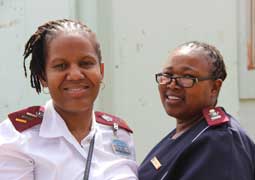
“I have had a perception that KwaZulu-Natal is doing well on infrastructure, but what I have seen during the oversight visit is different, and it is a worrying factor,” that was what the Acting Chairperson of the Portfolio Committee on Health, Mr Fish Mahlalela, said when he opened the meeting where the committee was briefed on the implementation of the National Health Insurance (NHI) pilot sites, in Mgugundlovu district yesterday.
The committee is on a week-long oversight visit in KwaZulu-Natal where it is visiting clinics and hospitals. The committee has targeted National Health Insurance (NHI) pilot sites.
NHI is a health financing system that pools funds to provide access to quality health services for all South Africans based on their health needs, irrespective of their social and class status.
Mr Mahlalela said the first phase of NHI has been done and now “we are entering into the second phase, as the committee during these visits we want to see the extent in which change has been effected in the healthcare system and what gaps are there”.
“There has been an outcry in the media that the system is in crisis, we want to investigate the veracity and truthfulness of these reports by the media, hence we are embarking on this oversight activity,” said Mr Mahlalela.
In June 2018 the committee invited the Office of Health Standards Compliance (OHSC) to provide its own analysis. The OHSC presented the findings of its 2016/17 Annual Inspection Report of public health sector establishments to the committee. The report showed that there is some improvement in certain areas and stagnation and decline in other areas.
On the third day of the oversight visit, the committee visited Mpophemeni Clinic, Umgeni Psychiatric Hospital and Imbalenhle Community Health Centre. Briefing the committee, the Manager of Mpophemeni Clinic, Ms Sandra Moody, said the clinic is a 24-hour clinic with maternity wards. It faces challenges of infrastructure and human resources because of budgetary constraints and high staff turnover.
Ms Moody indicated that the clinic was not designed to be a 24-hour facility, but due to the health needs of the community, changes were made to meet the community demands. One of the clinic’s achievements is the introduction of a youth friendly service where young people can be provided with health services separately.
During it’s walkabout at the clinic the committee had an opportunity to engage with patients who got an opportunity to voice their grievances. Most pertinent were long waiting times and that staff does not treat them well. Another patient grumbled, “abasiphethe kahle oo-nesi” (the nurses are not treating us well). The patients complained about the fact that if they visit the clinic after hours, they are told that the clinic only takes and prioritises emergencies such as accidents and people in labour, and if it is not an emergency, patients are not attended to.
At Umgeni Psychiatric Hospital, the staff was at pains and informed the committee that the majority of their patients have been abandoned by family members and some have been with the hospital as early as two weeks. The hospital caters for people who are mentally challenged, some with severe physical disabilities.
Throughout the oversight programme, clinics have indicated that one of the biggest cost drivers in their budgets is ARV medication. All clinics visited complained about space. And Imbalenhle Health Centre was no exception, it is a clinic that renders a 24-hour medical, nursing and maternity services. Clinic Manager, Ms Xoli Mthunzi, said the services rendered at the clinic and the patient load are rapidly increasing, but there is no working space to keep up with community demands. “The inadequate space compromises the confidentiality of patients due to the unavailability of consulting rooms,” said Ms Mthunzi.
As a clinic that is based in the location she said security is concerning as there is poor security coverage, the clinic has had delays in the finalisation of security contracts and a non-approval of CCTV installation.
A committee member, Dr Patrick Maesela, asked if the clinic is experiencing high rates of pregnancy, HIV/Aids infection and TB, what is it that the clinic is not doing in terms of community outreach. “What needs to be done or what are you not doing to curb HIV/Aids and TB?”.
Ms Mthunzi said the clinic does continuous outreach programmes to the community and schools to educate the people and also runs campaigns to create awareness.
The committee said the oversight has provided an opportunity and better understanding of how NHI is being implement, even though they did no visit all the districts, “but by visiting uMgugundlovu and Durban, the committee will have a clue on what is happening in KwaZulu-Natal and that can be used as a benchamark in what is happening in the province”, said Mr Mahlalela.
By Yoliswa Landu
17 August 2018

